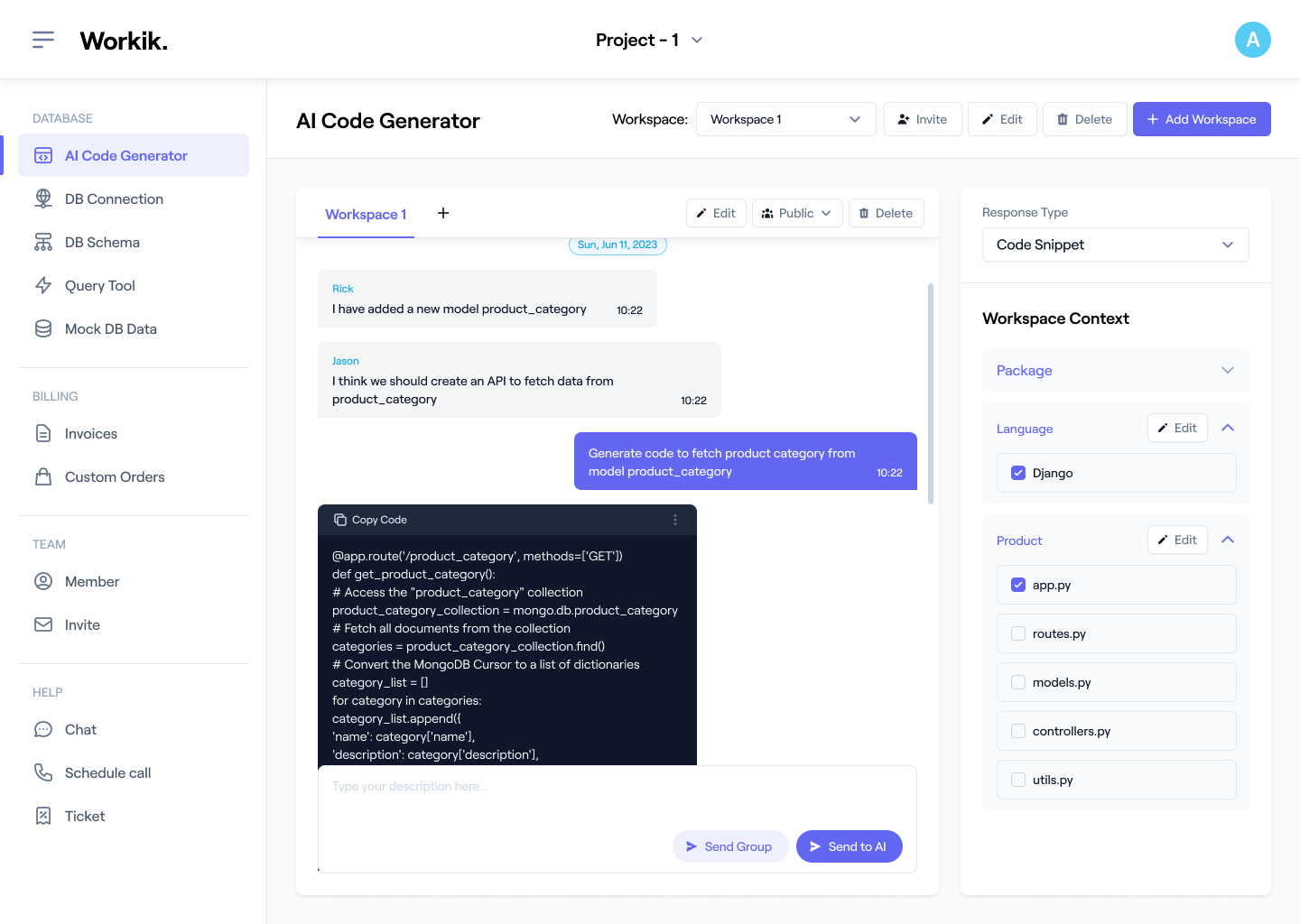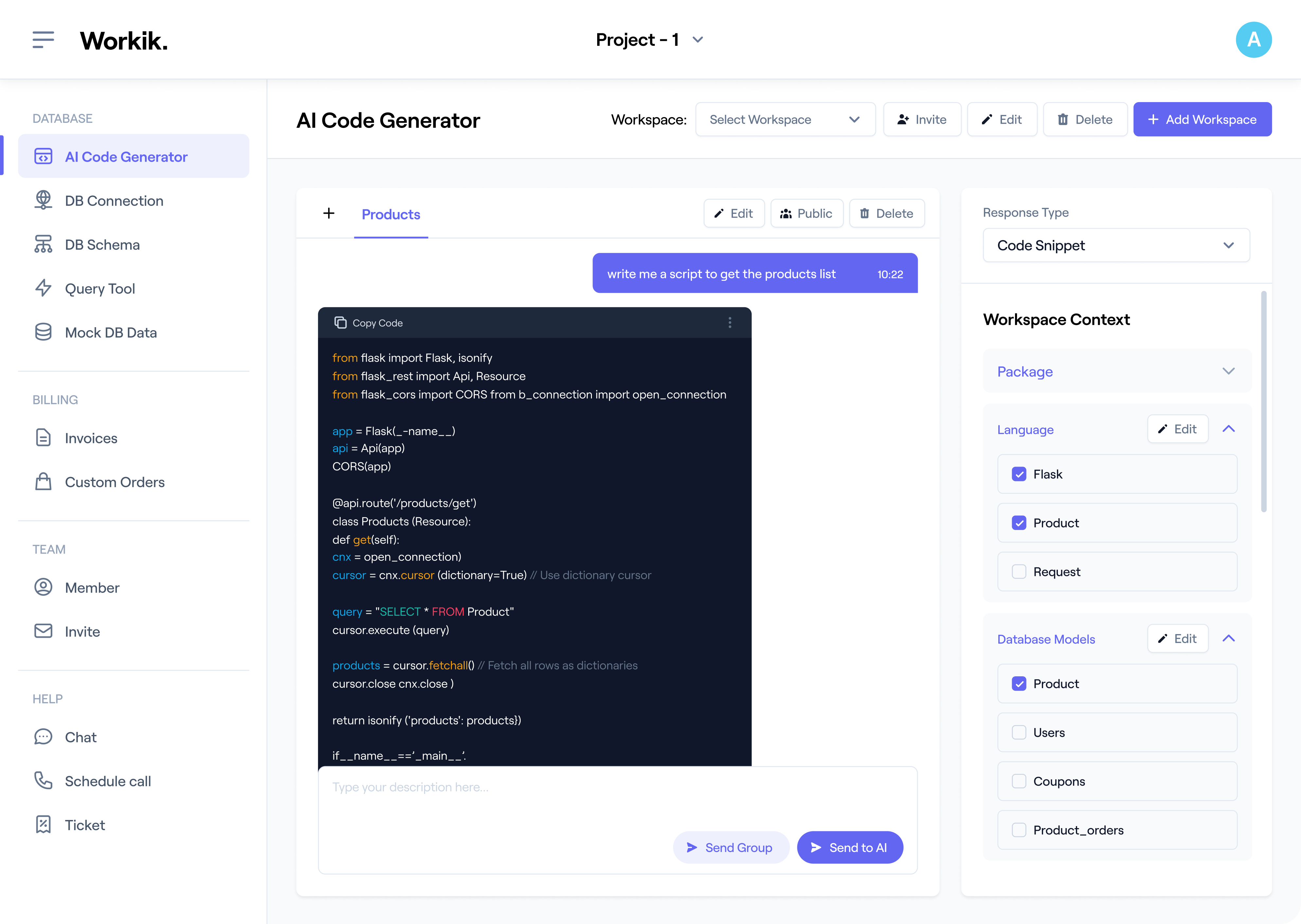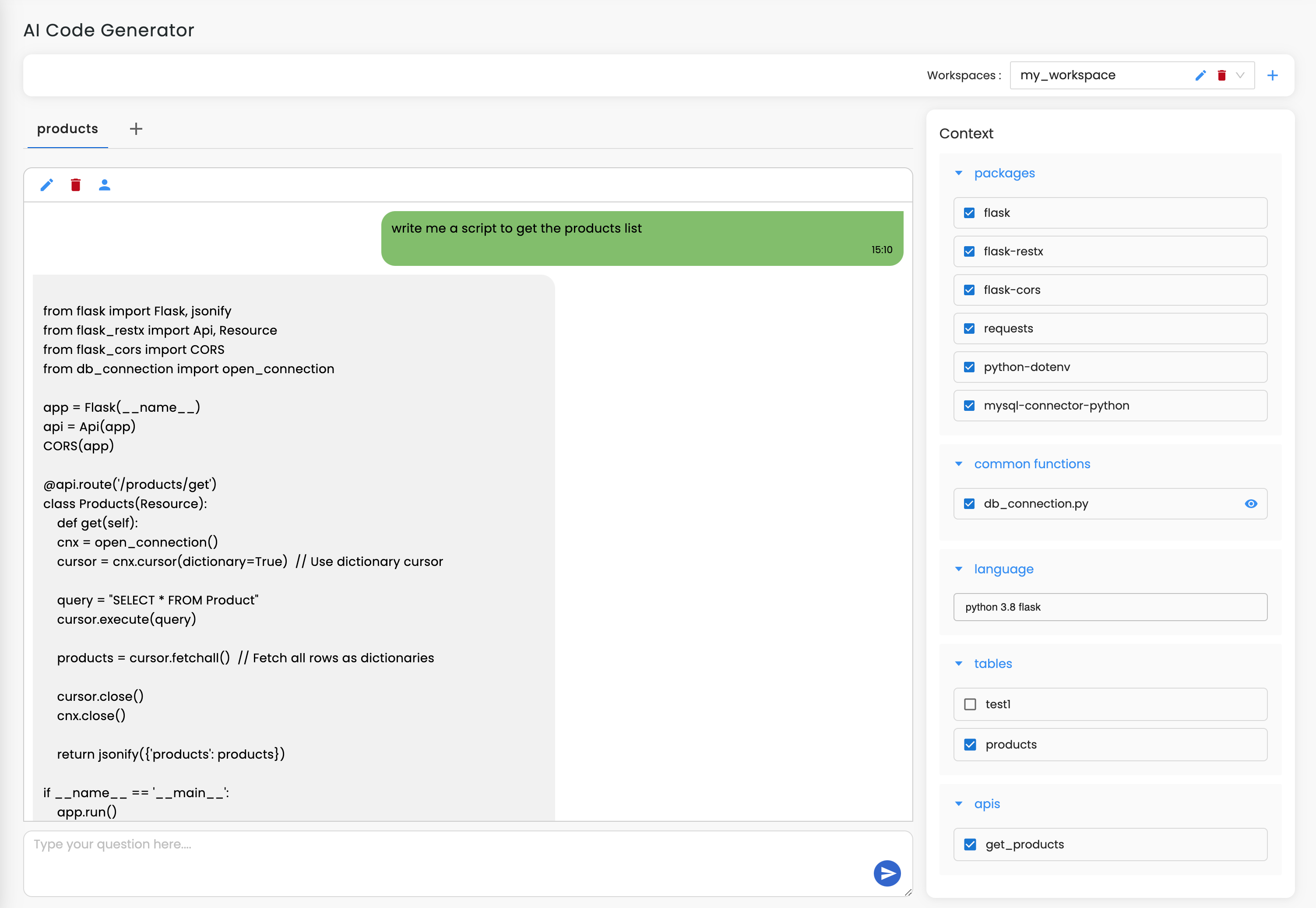
Join our community to see how developers are using Workik AI everyday.
Features

Optimize Project Scaffolding
Use AI to generate precise directory structures with Elixir and Ecto for seamless schema integration.

Streamline API Creation
AI can configure RESTful routes, controllers, models, and GraphQL support with Absinthe.

Build Real-Time Features
AI helps set up LiveView modules, enabling updates with minimal client-side JavaScript for dynamic UX.

Simplify Database Migrations
AI can craft Ecto migrations based on schema definitions, ensuring version control and data modeling with PostgreSQL.
How it works
Sign up on Workik with your Google account or manually enter your details to access Workik AI’s Phoenix development tools.
Connect your GitHub, GitLab, or Bitbucket. Add Phoenix-specific modules like controllers, routes, schemas, and LiveView components for tailored AI-driven assistance.
Use AI to generate optimized Phoenix code for real-time features, RESTful APIs, and database migrations. Automate testing, debug errors, and create comprehensive documentation with ease.
Work with your team to refine code in real-time. Deploy updates seamlessly with AI managing database connections, performance tuning, and scaling.


Expand
.png)
.png)
Expand


Expand


Expand


Expand


Expand


Expand


TESTIMONIALS
Real Stories, Real Results with Workik
Workik AI streamlined Phoenix migrations and real-time features, saving hours!

Freya Kline
Senior Backend Developer
Workik made Phoenix development simple, from scaffolding to LiveView.

Sameer Maheshwari
Junior Software Engineer
Workik AI excelled at API design, automating routes & schema setup effortlessly.

Mia Chen
Full-Stack Developer
What are some popular use cases of Workik’s AI-powered Phoenix Code Generator?


Some popular use cases of Workik’s AI-powered Phoenix Code Generator include but are not limited to:
* Generate robust web applications using Phoenix frameworks like LiveView.
* Automate database migrations with Ecto for seamless schema updates.
* Build RESTful APIs with controllers, routes, and model integrations.
* Optimize real-time updates for dynamic user interactions.
* Implement scalable background jobs with Oban for queue management.
* Simplify OAuth and third-party authentication setups.
What context-setting options are available in Workik’s AI for Phoenix Code Generator?


Workik offers several context-setting options to tailor Phoenix code generation, allowing users to:
* Add Ecto schemas, controllers, and routing configurations for precise AI assistance.
* Connect GitHub, GitLab, or Bitbucket to import and analyze existing projects.
* Configure real-time features with LiveView modules for dynamic updates.
* Include templates for project-specific documentation generation.
* Integrate scalable job queues using Oban for background tasks.
* Add custom middleware and Plug modules for tailored HTTP handling.
Can Workik generate role-based access control (RBAC) in Phoenix?


Yes, Workik AI can implement modules for role management, permission checks, and user hierarchy integration. For example, it creates context-specific access layers using Phoenix contexts and integrates with user authentication libraries like Pow or Guardian.
Does Workik AI support multi-tenant Phoenix applications?


Absolutely. Workik AI can generate schemas and controllers to handle tenant isolation. For instance, it configures Ecto queries to support subdomains or unique database partitions for each tenant, ensuring security and performance.
How does Workik AI simplify Phoenix app deployment?


Workik AI streamlines deployment by automating Docker configurations, NGINX setups, and CI/CD pipelines. For example, it configures release files with Mix Release and handles environment variables for staging and production effortlessly.
Can Workik AI help integrate WebSockets for advanced Phoenix functionalities?


Yes, Workik AI can generate WebSocket channels for real-time communication, automating message handling logic. For example, it sets up notifications, chat systems, or collaborative tools using Phoenix Channels and PubSub with minimal configuration.
How does Workik AI simplify localization in Phoenix apps?


Workik AI can configure Gettext for translations and create language-specific templates. For instance, it generates dynamic routing for multi-language support, ensuring seamless user experiences across global audiences.
Generate Code For Free

Phoenix: Question And Answer
Phoenix is a high-performance web framework built on Elixir, designed for creating scalable, maintainable web applications. Known for its real-time capabilities and modular architecture, it leverages functional programming paradigms and tools like LiveView for dynamic updates, Ecto for database management, and Plug for middleware integration.
Popular frameworks and libraries in Phoenix development include:
Database Management:
Ecto, PostgreSQL, MySQL
Real-Time Interactivity:
Phoenix LiveView, Phoenix Channels
Testing and Debugging:
ExUnit, Wallaby
Middleware and Routing:
Plug, Cowboy
Authentication:
Pow, Guardian
Job Queues and Background Processing:
Oban, Exq
Popular use cases for Phoenix include:
Web Application Development:
Build robust, scalable web applications with interactive interfaces using LiveView.
API Development:
Design and deploy RESTful and GraphQL APIs with optimized routing and controllers.
Real-Time Applications:
Create chat apps, collaborative tools, or dashboards with Phoenix Channels and PubSub.
Distributed Systems:
Build microservices and fault-tolerant systems with Elixir and Phoenix.
Background Task Processing:
Handle jobs like email processing or data exports with Oban or Exq.
Career opportunities and technical roles for Phoenix professionals include Phoenix Backend Developer, API Engineer, DevOps Specialist, Microservices Architect, Real-Time Application Developer, Security Specialist, Distributed Systems Architect, and Full-Stack Engineer with LiveView expertise.
Workik AI supports various Phoenix development tasks, including:
Code Generation:
Generate controllers, routes, schemas, and reusable modules tailored to specific use cases.
Debugging Assistance:
Identify runtime errors and suggest optimized error-handling strategies.
Database Management:
Automate migrations, query generation, and schema validations.
API Development:
Create RESTful routes, integrate external APIs, and generate authentication modules.
Performance Optimization:
Refactor controllers and middleware for faster response times and lower resource usage.
Testing:
Generate ExUnit tests for controllers, schemas, and real-time components like Channels.
Deployment:
Suggest Mix Release configurations, set up Docker containers, and automate CI/CD pipelines.
Explore more on Workik
Get in touch
Don't miss any updates of our product.
© Workik Inc. 2026 All rights reserved.

